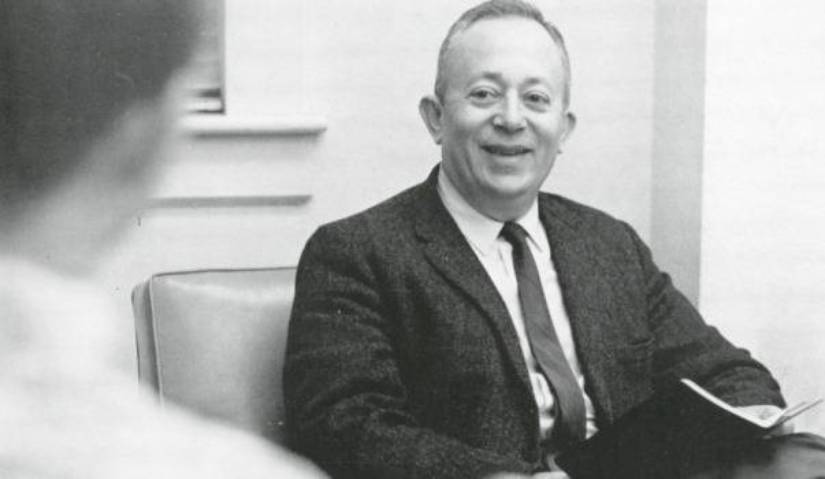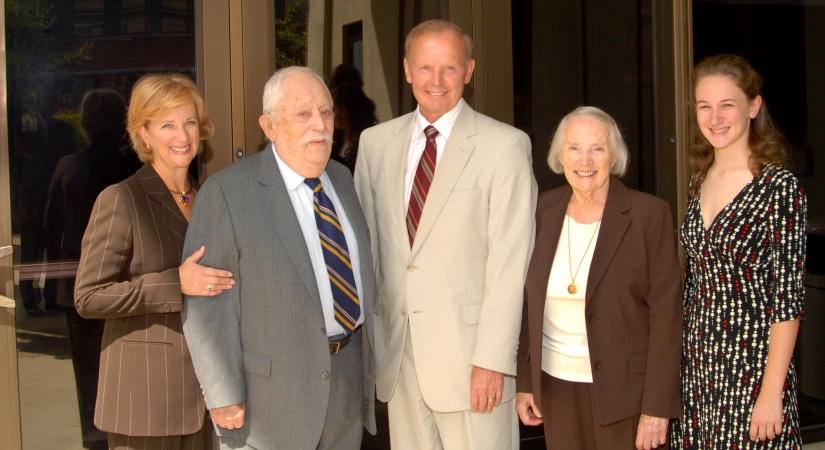He possessed a discerning disciplined presence befitting a leader.
Lives depended on him. Lives were influenced by him.
Dr. Charles H. Witten shaped the future for all he encountered.
Serving the country
Witten began his career as a research chemist with the General Printing Ink Corporation in Rochester, New York, until America called him to fight in World War II. Since he had two degrees in chemistry, Witten was offered a direct commission as a U.S. Navy Ensign in March 1941. This enlistment would become a defining moment for the direction Witten would take for the next 22 years.
He rose swiftly through the ranks to executive officer of the USS Maurice J. Manuel and the USS Okanogan, and then to commanding officer of a succession of four combatant ships. These assignments were strategic in North Atlantic convoy duty, Solomon Island Campaign, Invasion of Tarawa, Attack on Marcus Island, Philippines campaign, and the Okinawa Campaign. Staff jobs that he held were as Planning Officer for several high-level commanders such as COMMANDER IN CHIEF ATLANTIC COMMAND, NATO SUPREME ALLIED COMMANDER ATLANTIC and NATO COMMANDER IN CHIEF EASTERN ATLANTIC AREA.
The Destroyer History Foundation asked Lt. (jg) (later Capt.) Chuck Witten, USN (Ret.) to share an excerpt from his then unpublished biography Sailor, Scholar, and Traveler: The Life of Charles H. Witten As He Remembers It. Witten chose to discuss his position as being a radar officer, navigator, and “C” division officer on board the destroyer USS La Vallette, DD 448, during Battle of Rennall Island.
La Vallette was a destroyer in Task Force 18, destroyers and jeep carriers that were escorting the heavy cruisers Louisville and Chicago to the Solomon Islands. On January 29-30, 1943, this convoy valiantly fought against 1600 enemy aerial torpedo bombers. During that intense two-day battle, La Vallette was struck by an enemy bomber torpedo before ditching into the sea. “The plane passed so close over our stack, almost hitting it, that I could actually see the pilot’s face. Then ‘bang,’ we were hit,” noted Witten. “I guess I was knocked to the deck, and this is probably when I suffered the broken neck, which showed up years after I retired.” Undaunted by the inconvenience of pain, Witten completed his mission in the Solomon Islands.
Witten embraced each challenge in his life - military, civilian or educational service – as he did that day. With leadership came responsibility – a responsibility to act, lead, protect and help others.
Serving the University of South Carolina
At age 44, Witten retired from active duty to become the Commanding Officer of USCs Naval ROTC and Professor of Naval Science. He was considered one of the Navy’s younger Captains.
Witten was also a graduate of the US Navy Line School, the US Naval War College and completed a National Defense Education Act Fellowship at Michigan State University. In 1962, he earned a M.Ed. from the University of South Carolina College of Education while serving as the Commanding Officer of the USC Naval ROTC.
In 1963, then USC President Tom Jones formed an Ad Hoc Committee on University Affairs to oversee what would be dubbed I-Day (integration day) and named the former Naval Officer the new Dean of Students, known today as Vice President of Student Affairs. Witten outlined the university’s expectations for integration and encouraged each student’s full cooperation. On September 11, 1963, Robert Anderson, Henrie Monteith, and James Solomon enrolled at USC–Columbia as the first African-American students.
Witten recalled a poignant moment, which he mentions in Reflecting Back, Looking Forward, when former USC President Tom Jones introduced him to the V.P. of the Ford Foundation
by saying “I want you to meet my vice president in charge of all education outside
the classroom.” Witten thought that was very significant since “the role of student affairs was to facilitate the education of students and provide
for the education with such things that they didn’t get in the classroom.”
Witten intrinsically knew what needed to be done and then did it. During his twelve years as Dean of Students, Witten established many programs that are still in existence today at USC. Some of which are the Counseling Center, Office of Student Financial Aid, Office of Orientation, the Office of Career Advisement, International Student Affairs, Minority Student Affairs, Project Talent Search, Kampus Kiddie Kare, and the Office of Volunteer Services. He also established the first Upward Bound program at any state university in the Southeast and the first semiprofessional program to recruit resident advisors and hall directors for dormitories.
As a tribute to his vital role on campus, USC’s Garnet and Black staff dedicated the yearbook to Witten:
In deep appreciation for his outstanding service to Carolina, its administration and students, we proudly dedicate the 1966 Garnet and Black to
Dean Charles H. Witten
Administrator, professor and friend
The following year, Witten was appointed Director of the Southeastern Region of the National Association for Foreign Student Affairs (NAFSA). Founded in 1948, NAFSA is the professional organization for those working with programs in international educational exchange. Witten’s USC office worked with approximately 140 foreign exchange students from 36 different countries.
On June 30, 1975, Witten resigned from his duties in the Student Affairs Office to teach full-time in the College of Education, where he had taught since 1962 as an associate professor. In 1977, he took a sabbatical to earn a Ph.D. in Education from the University of North Carolina.
When interviewed by Bill Grant of the Gamecock staff, Witten said “Although, in the sum total my years as a student affairs administrator have been very satisfying years, as I have seen progress and accomplishments, they have not been without their price in weariness and detraction from personal and family life.”
Of Witten’s departure, then V.P. of USC’s Operations Harold Brunton said “Dean Witten had a rough twelve years. When he first came to USC and took over student affairs, he was faced with integration. Then there was the wide change in regard to student ideas, and the riots of 1970. Dean Witten helped to change the resident life from ‘just a bed’ to the institution of many recreational facilities available to students living on campus.”
Serving education
Witten was instrumental in starting USC’s College of Education master's and doctoral programs in the School Leadership and Higher Education Administration.
The Higher Education and Student Affairs (HESA) M.Ed. prepares professionals for careers in admissions and records, academic administration, alumni affairs, career development and employer relations, international student programs, new student orientation, student activities, student advisement, student financial aid, student housing, and student judicial programs. Witten co-edited Student Personnel Administration, which was the standard text for the program in beginning courses for many years.
Witten also started the Higher Education Administration Ph.D. program, which prepares students for a variety of leadership positions in institutions and agencies. Graduates of the program serve as university administrators, school superintendents and principals, administrators in school districts and government agencies, college and university faculty, and other leadership roles.
In 1985, Witten held a Fulbright Award to study the culture of Pakistan and, with a group of educators, advised Pakistan's Minister of Education. In 1986,Witten retired from USC College of Education as Distinguished Professor Emeritus.
Learn more about the School Leadership and Higher Education Administration programs.
Serving future leaders
To inspire and encourage students to pursue leadership roles in higher education, Witten established the Charles H. and Margaret M. Witten Fellowship, awarded to doctoral student(s) who is enrolled in the HESA program and the James B. Campbell-Charles H. Witten Fellowship, which honors honors two former Vice Presidents of Student Affairs at USC.
Give to or Apply for these fellowships.
The Museum of Education's Charles and Margaret Witten lecture brings to the campus distinguished academics from the fields of education and the humanities that invigorates the academic discussions of the faculty, staff, and students.
Taps
The College of Education remains eternally grateful for Dr. Witten’s influence and leadership. Each USC faculty, student, and staff member will cherish their personal memory of Dr. Witten and the interaction that they shared with this legendary man, hero and leader. Rest in peace Dr. Witten (November 18, 1918 - July 21, 2015). We are honored to have known you.

